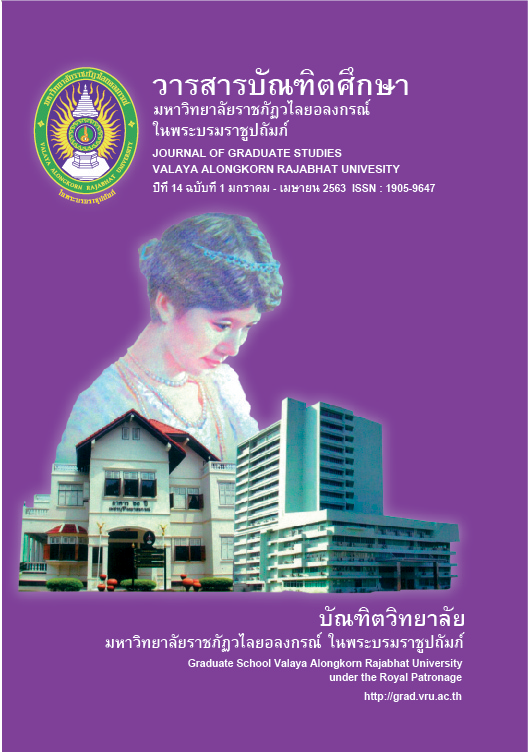MIXED METHODS RESEARCH
Main Article Content
Abstract
The current mixed methods research combined both quantitative and qualitative approaches together in different types. This paper proposed two principle types consisting of basic mixed methods research and advance mixed methods research. Each of these two types involving 7 different models which could be applied to various research objectives as follows: 1. A convergent Design Model: The quantitative and qualitative data were collected and analyzed to compare the result, 2. An Explanatory Sequential Design model: the quantitative approaches was conducted followed by the quantitative approaches and its result were utilize to explain the quantitative approaches deeply, 3. An Exploratory Sequential Design Model: begin with studying the state of the problems using quantitative approaches and utilize its result to design the quantitative research later, 4. Experimental Design or Intervention Design Model: the qualitative data were Studied and collected during, before or after the experiment, 5. Case study Design Model: the two set of the data were conceptualized together in each case and compare the results of each case, 6. Social Justice or Transformative Design Model: this model concerned mainly with the social justice and it was conducted by collecting the data of human living, 7. Multistage Evaluation Model: this mixed method s model using the diversified design and long term period. The model 1 - model 3 are core type of mixed methods research and model 4- model 7 are advance type of methods research These core mixed methods research could be applied for conducting the advance mixed methods research, of which could be selected coping with the research objectives. These designs of mixed method research can applied to both social sciences and research.
Article Details

This work is licensed under a Creative Commons Attribution-NonCommercial-NoDerivatives 4.0 International License.
บทความทุกเรื่องได้รับการตรวจความถูกต้องทางวิชาการโดยผู้ทรงคุณวุฒิ ทรรศนะและข้อคิดเห็นในบทความ Journal of Global of Perspectives in Humanities and Social Sciences (J-GPHSS) มิใช่เป็นทรรศนะและความคิดของผู้จัดทำจึงมิใช่ความรับผิดชอบของบัณฑิตวิทยาลัย มหาวิทยาลัยราชภัฏวไลยอลงกรณ์ ในพระบรมราชูปถัมภ์ กองบรรณาธิการไม่สงวนสิทธิ์การคัดลอก แต่ให้อ้างอิงแหล่งที่มา
References
Anderson, J. K., Croxon, L. & McGarry, D. E. (2015). Identifying student knowledge and perception of what is valuable to professional practice: A mixed method study. Nurse Education Today, 35(12), 1240–1245.
Brown, G., Strickland-Munro, J., Kobryn, H. & Moore, S. (2017). Mixed methods participatory GIS: An evaluation of the validity of qualitative and quantitative mapping methods. Applied Geography, 79, 153-166.
Creswell, J. W. (2015). A concise Introduction to Mixed method Research. Los Angeles: Sage.
Creswell, J. W., & Plano Clark, V. L. (2007). Designing and conducting Mixed Methods Research. Thousand Oaks, CA: Sage.
Creswell, J. W., & Plano Clark, V. L. (2011). Designing and conducting Mixed Methods Research. 2nd ed. Thousand Oaks, CA: Sage.
Creswell, J. W., & Plano Clark, V. L. (2018). Designing and conducting Mixed Methods Research. 3nd ed. Los Angeles.
Creswell, J. W., Plano Clark, V. L., Gutmann, M. & Hanson, W. (2003). Advanced mixed methods research designs. In A. Tashakkori & C. Teddlie [Eds.], Handbook of mixed methods in social & behavioral research [pp.209-240]. Thousand Oaks, CA: Sage.
Edmonds, W. A., & Kennedy, T. D. (2013). An Applied Reference Guide to Research Designs: Quantitative, Qualitative, and Mixed Methods. London: Sage.
Hurley, E., McHugh, S., Browne, J., Vaughan, L., & Normand, C. (2019). A multistage mixed methods study protocol to evaluate the implementation and impact of a reconfiguration of acute medicine in Ireland’s hospitals. BMC Health Services Research, 19(1), 1-11.
Kaya, V. H. & Elster, D. (2019). Environmental Science, Technology, Engineering, and Mathematics Pedagogical Content Knowledge: Teacher’s Professional Development as Environmental Science, Technology, Engineering, and Mathematics Literate Individuals in the Light of Experts’ Opinions. Science Education International, 30(1), 11–20.
Klangphahol, K. (2018). wičhai bǣp phasom withī [Mixed method research]. Ang Thong: Vorasin 89.
Lottero-Perdue, P. S. & Parry, E. A. (2017). Elementary Teachers’ Reflections on Design Failures and Use of Fail Words after Teaching Engineering for Two Years. Journal of Pre-College Engineering Education Research, 7(1), 1–24.
Márquez, M. G., & Delgado, A. R. (2017). An exploratory sequential design to validate measures of moral emotions. Psicothema, 29(2), 261–267.
Sami, S., et al. (2018). Understanding health systems to improve community and facility level newborn care among displaced populations in South Sudan: a mixed methods case study. BMC Pregnancy & Childbirth, 18(1), 1-12.
Schoonenboom, J., & Johnson, R. B. (2017). How to Construct a Mixed Methods Research Design. Köln Z Soziol, 69, 107–131.
Simona, L & et al. (2016). Family-Centered Care in Juvenile Justice Institutions: A Mixed Methods Study Protocol. JMIR Res Protoc, 5(3), e177. Retrieved from https://www.researchprotocols.org/2016/3/e177/
Tashakkaori, A. & Teddlie, C. B. (2010). Handbook of Mixed Methods in Social and Behavioral. (2nd ed.) Thousand Oaks, CA: Sage.
Van Velzen, J. H. (2019). (Quasi-) Experimental Research on Teaching and the Issue of Assigning Teachers: Towards a Qualitatively Driven Mixed Methods (Quasi-) Experimental Design. Research in the Schools, 26(1), 25–34.
Watson, S. L., et al. (2017). Learner profiles of attitudinal learning in a MOOC: An explanatory sequential mixed methods study. Computers & Education, 114(November), 274–285.


